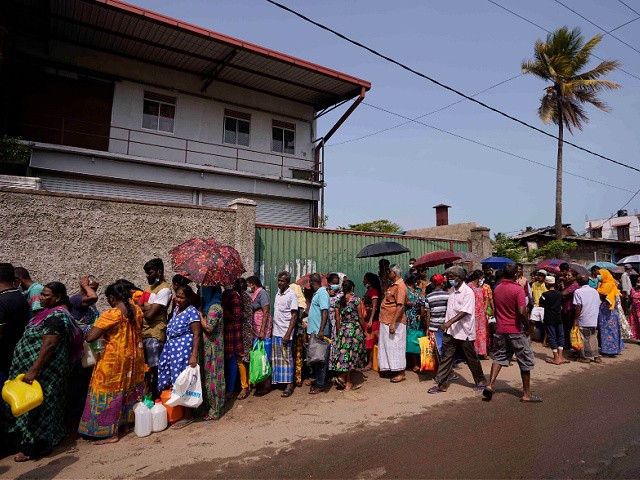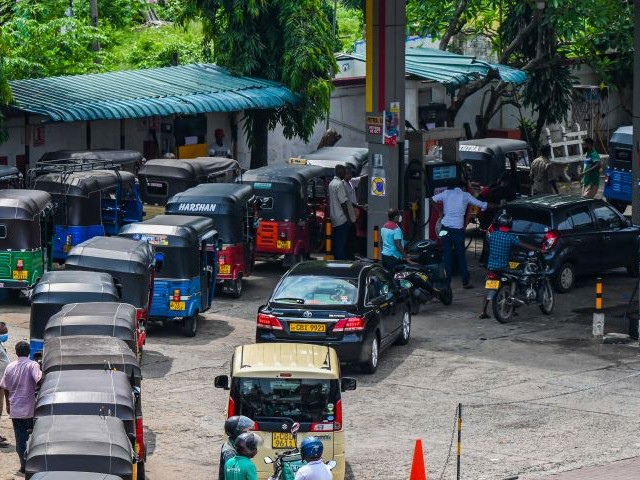The Minister of Power and Energy of Sri Lanka announced on Thursday that the socialist government would implement the use of a mobile phone app to monitor how much gasoline, diesel, and other fuel citizens purchase to prevent hoarding.
Minister Kanchana Wijesekara claimed that police nationwide were already testing the app, designed to “share real-time data with filling stations island-wide” so that drivers could not evade national rations, according to Sri Lankan news outlet Ada Derana.
The Democratic Socialist Republic of Sri Lanka is currently undergoing an unprecedented economic crisis that has caused shortages of gasoline, diesel, liquified petroleum gas, basic medicines, food, water, and electricity, in addition to nearly every other basic good. Protests against incumbent President Gotabaya Rajapaksa have resulted in the resignation of every member of his cabinet except the president – including the brother and former Prime Minister Mahinda Rajapaksa and several other members of the ruling family.
A combination of poor decision making regarding taking predatory loans out with China, banning chemical fertilizers and instead relying on food imports, corruption, and the collapse of the tourism industry during the Chinese coronavirus pandemic have left the country destitute.
Prime Minister Ranil Wickremesinghe, who preceded and succeeded Mahinda Rajapaksa, announced in mid-May that Sri Lanka had simply run out of fuel.
“The next couple of months will be the most difficult ones of our lives,” Wickremesinghe warned on May 16. “I have no desire to hide the truth and to lie to the public.”
The Rajapaksa government has since succeeded in importing small quantities of vehicle fuels, resulting in extremely long lines at gasoline stations and limits on how much gasoline each purchaser can buy at once. Government officials have pivoted to blaming hoarders for the shortages, announcing on Thursday that police had arrested 137 people for allegedly inappropriately purchasing gasoline, diesel, and kerosene.

Sri Lankans wait in a queue to buy kerosene oil for cooking outside a fuel station in Colombo, Sri Lanka, Wednesday, May 11, 2022. (AP Photo/Eranga Jayawardena)
The mobile app Wijesekara announced on Thursday would reportedly allow for more such police actions.
“According to the lawmaker [Wijesekara], the mobile application, developed by the IT department of Sri Lanka Police, is being tested at multiple locations in the country at present,” Ada Derana reported. “Taking to his official Twitter account, Minister Wijesekara said the number plate details of the consumers at the gasoline pump will be entered and will be shared with other app users.”
Presumably, the application will notify a gas station immediately if the car seeking to buy fuel had purchased any in the recent past. The energy minister reportedly did not inform the public of any privacy features the app comes equipped with, if any.
The application is reminiscent of the use of phone programs to surveil citizen purchases in other socialist countries. In Venezuela, for example, the government implemented the use of an app known as the “Fatherland Card,” reportedly built by China’s ZTE telecommunications company and mandatory for citizens to buy basic food, fuel, and other goods, as well as for health care and other government services.
As of Tuesday, Sri Lankans are only allowed to purchase 10,000 rupees worth of gasoline at any given time, about 24 gallons of Octane 92 gasoline, the cheapest variety.
While the government attempts to curb alleged hoarding, local news reports indicate that various mishaps by those in charge of obtaining and distributing fuel are also contributing to shortages. On Friday, Sri Lanka’s News First reported that one gas station accidentally switched diesel and gasoline fuels, meaning full tanks of vehicles had to be emptied because they were filled with incompatible fuel.
“Because my vehicle was not moving, I went all the way up to Kochchikade and turned around and came back. When I came back, oil started pouring out from all four sides. I was unable to move it,” one eyewitness told the network.
